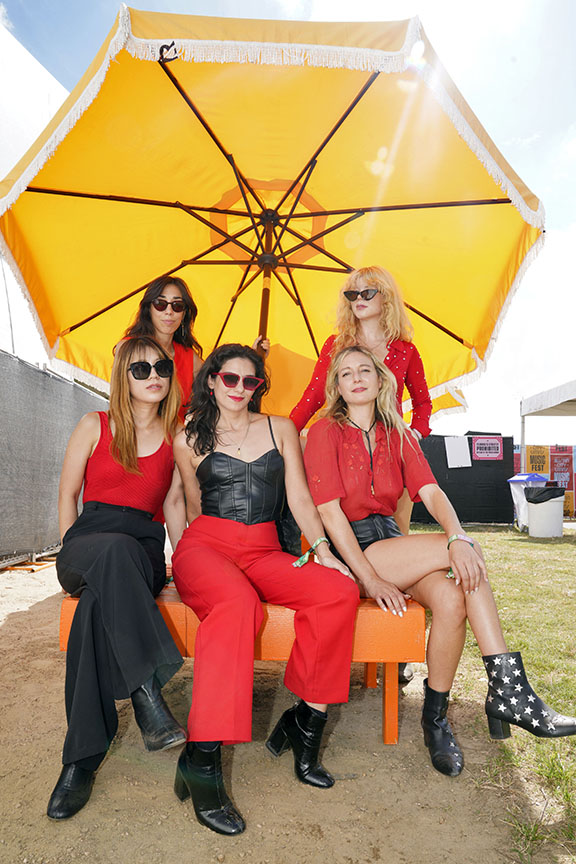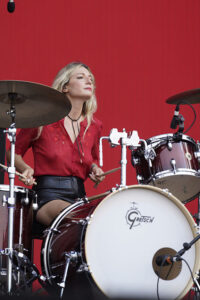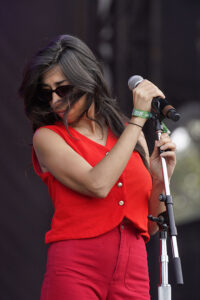
By: Madisyn Siebert
Photos: Cory Weaver
Habibi may not be a band that is on your radar, but they need to be. This all-girl band is not only bringing unique music to the world, but they are also demanding attention to the problem facing women in Iran. Mixing disco, Motown, psych, English and Farsi you are welcomed into the world of Habibi. Learn more about the band and their music below when we got a chance to catch up with them at ACL.
Meet the band Habibi:
Hi, I’m Rahill Jamalifard. I sing.
I’m Lenny Lynch. I play guitar.
I’m Lyla Vander. I play drums and I’m happy to be here.
I’m Yukary. I play bass.
Hi, I’m Anna. I play guitar.
Bands Through Town: Awesome. All right. So how does it feel to be down here at Austin City Limits?
Habibi:
Rahill: Really hot, very good.
Lenny: Hot in more ways than one. We’re super honored to be here. This was something I was telling Rahill where so many of my friends have reached out and been like, congratulations, you know, where I was like, oh, this is something special that we’re doing. I remember, even just when we got, we booked the show, I don’t tell my dad everything, but I told my dad about this show and he was like, what? You know, very, very special.
BTT: Are there any bands that you guys are like, oh, I wanna go catch them while I’m here? Anybody that caught your eye?
Habibi:
Rahill: I think we all are really curious to see Lil Nas X performance. Yes. I wanna see Princess Nokia, she’s a New Yorker as well, and just wanna see her.
Lenny: We wanna see Boy George. I hope we’re not missing it right now!
BTT: So where did the band name come from? I believe it’s Farsi, correct?
Habibi:
Rahill: It’s Arabic. Yeah, I sing in Farsi.
It was Lenny’s idea.
Lenny: So, the meaning of the word is my love, my, you know, my friend, it’s a term of affection. And I think a lot of my friends growing up in Detroit, they used this, a lot of them are Syrian and Lebanese. And when I met Rahill, it was something that was commonly used with her family. It was, this term is the crossed over boundaries to be just like a really lovely word. And I loved the use of it. So that’s what it became. The band’s name.
Rahill: Yes. It’s just a universal term, like that just is a term of endearment. And so to represent something that we love doing, it just made sense.
BTT: So how would you guys personally describe your sound? Cause I have an idea, but I would like to hear it from your own words and see if we might use the same ones.
Habibi:
Rahill: Well, it’s been changing. I mean, as a band we keep evolving, thank God, because we’ve been together for like 10 years, I would say. So, I think we started with roots in Middle Eastern psych, like Turkish and Iranian psych. But, also we’re from Michigan so we have this like great Motown history too, so heavy girl harmonies kind of style. So those are like the roots and the foundation. And then, you know, we have songs that are really punk and inspired by like Kleenex and, Tom Tom Club and then disco, you know, we love disco too.
Lenny: Yeah. I feel like we want to create things a lot of times based off what you’re listening to or what is gonna excite you. And so I think that it’s evolved, there’s always the Habibi bass line coming out, you know, there’s always simplistic melodies and not too many chords that are dangling up the whole song. It’s pretty straightforward, but now it’s going more into the disco and the punk realms, which is really fun for us.
Rahill: And Lenny naturally has this ability to kind of play like pentatonic scale, which is more Middle Eastern sounding. So we hit a lot of those notes and, I mean, I think that’s like a Habibi sound that’s like consistently been present in the songs too.
BTT: So, how important is it to you to include Farsi lyrics in your music?.
Habibi:
Rahill: Yeah, I think that, like for me, anything that I’m putting out creatively, it’s always there. It’s like ever present because it’s very much ever present in myself individually, but I feel like sometimes it’s indirect. So I’m singing about something, I make a reference that nobody might know unless, you know, they are clued into something. But then other times it’s more direct where I sing out in Farsi. But, I think it’s just present and it’s not like a choice like oh I, I am trying to do this. It’s just what I’m moved to.
BTT: I get that. My roommate in college spoke Farsi because her family was originally from Iran. And, it was so funny to me because she could speak French, Farsi and English fluently, she would talk in her sleep and she would mix all three languages together. I can speak a little French so I could understand the French and the English and then the Farsi was kind of like out the door for me. It’s just like part of the natural thing. Like it just comes out. Because there are words, she’s like, oh yeah, I can’t really say this in English.
Habibi:
Lenny: She’s a sleep talker. So I woke up last night to “you must reveal yourself.” I was like, reveal yourself?
BTT: Amazing. You guys have quite a bit of narrative storytelling in your songs. Can you elaborate on how you come up with these stories and lyrics and all that fun stuff?
Habibi:
Rahill: I think from the go, it was always a habibi heroine and it’s about women championing. I referenced ‘she’ a lot, which I think a long time ago, people were always like, oh, it’s weird you sing about a woman or a girl. Like, you know, it has nothing to do with my sexual orientation. It’s just our heroine is like a powerful woman and I like storytelling. So, it’s from the perspective of either somebody adoring this person/admiring this person or being that person.
I guess there’s other themes I sing about like Persepolis is dedicated to my grandfathers again, like the Iranian heritage. I think a lot of times I’m saying ‘she’ and I like that it’s taken on this persona that it’s this woman who is representative of all females basically, but like, you know, just like somebody we admire, I guess.
BTT: In “Come My Habibi” in the middle of the song you guys have that. I don’t even know how to capture what it is, but was that planned, or was that a moment of just like, this is something we wanna add?
Habibi:
Lenny: Yeah. I feel like that was a song that came together. It was the first song that I ever showed. Like just the bassline. It wasn’t a song yet, it was just like the bassline of the song, which is the guitar line. But I showed it to Rahil when we first met each other and then everything we were coming up with was like, Detroit Baby, you know? It didn’t fit with the first album at all. And we were like, well that’s really heavy. Let’s take a pause on this and then go back to it. And then figured out where it would fit and, and how it’s gonna fit.
And then, this was a complete coming together in the studio with everybody involved. Like our friend Mina did ululation, which I wish you could go on tour with us all the time and do it.
Rahill: It’s not something we had today. But it’s like a cause for celebration. It’s like we grew to be able to have that psych-heavy psych sound, but, when we first started, like Lenny said, it was mostly our Motown influence and it felt fitting on the last record that we did include it. But, yeah, it wasn’t something like the vision was there but it wasn’t fully realized. And then you can feel it in that, especially the ending breakdown part is like we figured out that part of it.
I also think a lot of times with Middle Eastern music too, there’s this kind of Sufi music or something where you go into a trance almost and it’s supposed to build in this hypnotic sound. I think that it’s a nod to that, but it’s also a nod to the psych and heavy, like heavier psych that we also listen to.
BTT: Awesome. And then one last question. New music. What direction are you guys going towards? Anything inspiring?
Habibi:
Lenny: We’re making you dance, we’re making you drive really fast in your car and have your leg on your honey and make out as soon as possible. It’s very, I think sexy, it’s fun and it’s coming out next year on Kill Rock Stars [record label].




